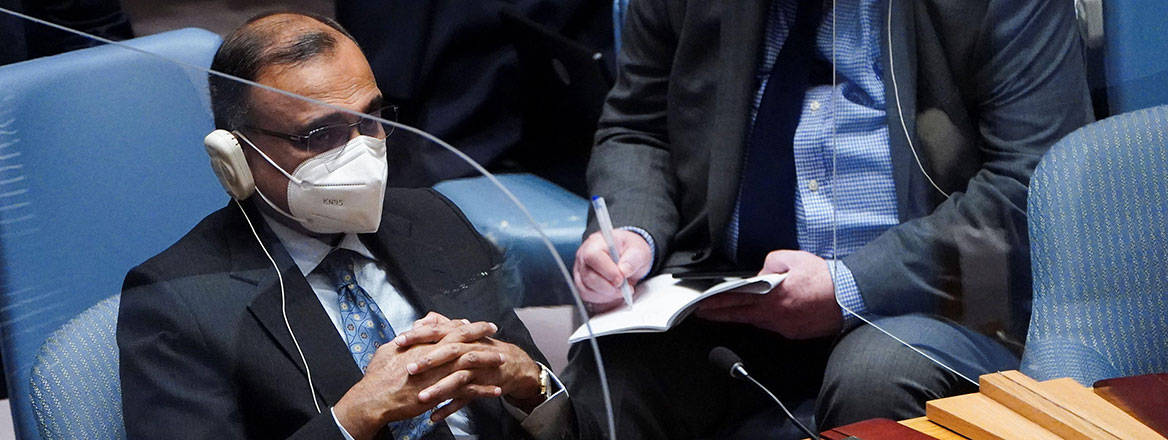India’s Diplomatic Tightrope on Russia’s Invasion of Ukraine
India’s disagreements with Russia’s actions are being overridden by more immediate security interests.
India is in a difficult spot in responding to the Russian invasion of Ukraine. It has not explicitly criticised Russia’s actions, instead abstaining from votes that condemn Russian aggression at the UN Security Council and General Assembly.
This has understandably disappointed observers in the West who believed that an India that has grown increasingly closer to it over the past few years and that has been counted among ‘like-minded partners’ would be in greater alignment on this issue.
However, these expectations may have been misplaced. There is indeed growing convergence between India and Western countries on priorities in the Indo-Pacific, including on their aims to balance the growing influence of China, but this convergence does not extend to how the two sides approach Russia.
New Delhi’s Concerns and Constraints
India needs to maintain its relationship with Russia for multiple reasons. It is by far the largest supplier of India’s military, with various estimates putting the share of Russian-origin equipment at between 60% and 85% of India’s arsenal. It is especially critical for India to ensure that this supply is not disrupted at a time when India faces a more aggressive China along the disputed Line of Actual Control (LAC) and observers as well as decision-makers seem to have determined that any fight on India’s border will have to be fought alone.
Although India has been attempting to diversify and indigenise its military equipment, this is not a straightforward or short-term proposition. The current crisis has led to some introspection on existing dependencies and supply lines, but efforts to diversify are often compromised by the fact that Russia has been willing to share advanced military technology with India while other countries have hesitated to do so. Thus, while India is the largest buyer of Russian equipment, its dependence on Moscow for specific weapons systems that it cannot acquire elsewhere or at the same price, such as the S-400 surface-to-air missiles and the technology behind the Arihant-class nuclear-powered submarines, limit its ability to exercise leverage on Russian decisions on European security matters.
Russia has also been an important supporter of India in multilateral forums, including the UN Security Council, on issues sensitive to India, such as Jammu and Kashmir. This has generated significant trust between New Delhi and Moscow and is likely to factor into Indian decision-making on Ukraine.
An additional dilemma for India is that Russia’s actions in Ukraine, coupled with the strong Western reaction, may increase Russia’s economic and strategic dependence on China, with whom it already enjoys a close relationship. Although India will not be able to prevent these ties from deepening, it is nevertheless in its interests to not alienate Moscow owing to its reliance on Russian defence supplies and the security threat it faces from China. The delicate balance between these relationships was highlighted when Indian Defence Minister Rajnath Singh flew to Moscow after Indian and Chinese troops clashed along the LAC in June 2020 to ensure the continued supply of military equipment.
In addition, Pakistani Prime Minister Imran Khan’s visit to Moscow, the first by a Pakistani prime minister in 23 years, is likely to raise concerns in India, as it represents a potential milestone in an increasingly closer Pakistan–Russia relationship.
Also at the forefront of the Indian government’s efforts during the war has been the evacuation of its citizens in Ukraine. In the days leading up to the invasion, the Indian government was arranging flights out of Ukraine up to the first week of March, suggesting that New Delhi did not anticipate rapid escalation to the current level of conflict. Advisories by the Indian Embassy in Ukraine later became increasingly urgent.
On 2 March, after an Indian citizen was killed in Kharkiv and following a phone call between Prime Minister Narendra Modi and President Vladimir Putin, India asked its citizens in Kharkiv to immediately move towards specified areas on the city’s outskirts, suggesting that coordination with Russia was likely deemed necessary by the Indian government to secure the stranded Indian citizens, many of them medical students.
Russia has also been an important supporter of India in multilateral forums, including the UN Security Council, on issues sensitive to India, such as Jammu and Kashmir
Russia’s invasion of Ukraine is, however, in tension with India’s historical preferences on territorial integrity and sovereignty, issues important to India given its territorial disputes with China and Pakistan. India’s discomfort is demonstrated by the evolution in its statements at the UN. While India appears to have disappointed many of its Western partners through its soft-pedalling on Russia, its more recent statements and explanations accompanying its abstentions reflect its unease with Russia’s actions. In statements following the invasion, India has emphasised the deteriorating humanitarian situation and the need to respect ‘the sovereignty and territorial integrity of states’ as well as omitted references to the ‘legitimate security interests’ of all sides, mentioned in earlier statements and a position consistent with previous Indian governments. New Delhi also contradicted the Kremlin’s allegations that Indian students in Kharkiv were held hostage by Ukrainian security forces.
Western Frustrations
India’s stance at the UN on Russia’s invasion of Ukraine has raised questions among Western observers on whether India can be relied on to uphold a rules-based international order. However, neither appeals to India’s pride at being the world’s largest democracy nor criticisms of its attempts to get around sanctions, particularly while Europe continues to purchase Russian energy, are likely to resonate in New Delhi. Besides the tangible security interests served by not antagonising Russia, India and the West diverge on a variety of issues, whether that is on interpretations of freedom of navigation or the validity of spheres of influence.
India’s relationships with the West have indeed deepened, particularly on the economic front and on security cooperation in response to China’s coercion in the Indo-Pacific. However, there must be a more clear-eyed assessment of the extent to which shared values can drive policy. India’s most pressing security concerns remain continental, and its history of colonialism and experiences during the Cold War have left behind a residual mistrust of the West. This has receded since the 1990s but nevertheless rears its head when differences arise.
In spite of these tensions, the trajectory of India’s relationship with its Western partners will likely be determined by the importance of the Indo-Pacific in Western policymaking and an assessment of India’s role in that part of the world. While there are concerns that in the shorter term, the Joe Biden administration will prioritise European security, its recently released Indo-Pacific strategy suggests that, in the longer term, the challenge posed by China is likely to be the predominant focus of US policy. Even as Russian troops moved into Ukraine, India hosted a multilateral naval exercise in which the US participated for the first time. Notably, under the Quad’s refreshed agenda, which focuses on non-military and transnational aspects of competition in the Indo-Pacific, India will continue to be an important partner.
However, in addition to working around the crippling international sanctions imposed on Russia in recent weeks, India must also contend with the possibility of being hit with sanctions under the Countering America’s Adversaries Through Sanctions Act, which prohibit significant purchases of military equipment from Russia. Until recently, there has been widespread support for India to receive a waiver for these sanctions, owing to the utility of these weapons in fortifying India against China. While the Biden administration has demonstrated an understanding of the complexities of India–Russia defence ties, this will undoubtedly become a more complicated conversation following Russia’s attempts to alter the European security order.
The solution to this lies not in preventing India from accessing the arms it requires for its defence, which would only heighten India’s anxieties about the West, but in expediting its drive to diversify and indigenise its defence equipment. This would not only help reduce its dependence on Russia but also create more enduring ties between India and its ‘like-minded’ partners.
The views expressed in this Commentary are the author’s, and do not represent those of RUSI or any other institution.
Have an idea for a Commentary you’d like to write for us? Send a short pitch to commentaries@rusi.org and we’ll get back to you if it fits into our research interests. Full guidelines for contributors can be found here.
Aaditya Dave
Former Research Analyst, South Asia


